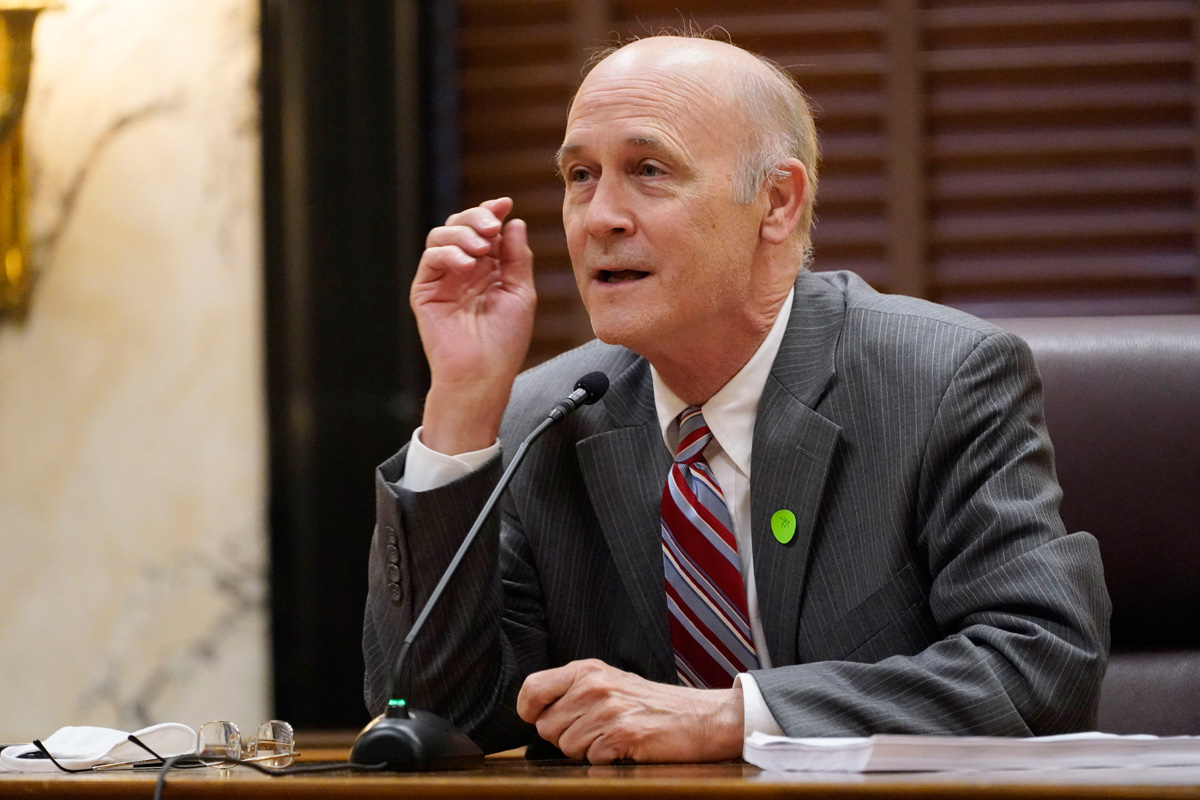The board that oversees Mississippi’s Public Employees Retirement System would have its powers limited under a bill that the governor could soon sign into law.
The Mississippi House and Senate each passed the bill after the board decided to increase the local government’s retirement contribution to an employee’s paycheck by 5% over three years. The board was planning to increase the employer contribution rate to 22.4% after three years.
“We’re very angry at them for trying to increase payroll, and they have no understanding of what a burden this will be on everybody,” Sen. Hob Bryan, D-Amory, said on the Senate floor on April 26. “They don’t think it’s a good idea to assess payroll. It’s the only thing they can do under the law, and they’re required to do it under the law.”

Senate Bill 3231 would prohibit the PERS board from increasing the state and local government’s contribution rate for taxes.
“Our review showed significant actuarial errors every year,” Lt. Gov. Delbert Hosemann told reporters on May 3. “That means the numbers weren’t right, and over the last 15 years they were off about $114 million from the average.”
The Senate passed S.B. 3231 on April 26 by a 34-14 vote, and the House passed it on April 17 with a 107-1 vote. Gov. Tate Reeves has until Wednesday, May 8, 2024, to sign the bill into law. He could also veto it or allow it to become law without his signature.
Victim Notifications for Parole Hearings, Release
The Mississippi Parole Board must notify the victim or victim’s family of an incarcerated offender’s impending release at least 15 days ahead of time under a bill Gov. Tate Reeves signed into law on April 30.
House Bill 844 says the victim or victim’s family members would be able to attend a hearing before the board decides whether to release the offender on parole no later than 30 days before the person is released from prison.
The bill says that if the offender committed a crime of violence, “the board shall, within thirty (30) days prior to the scheduled hearing, solicit the written or oral recommendations of the Attorney General, the attorney who prosecuted the case, the judge who presided over the case, the chief of police of the municipality where the offender was convicted and the sheriff of the county where the offender was convicted.”
Machine Gun Convertor Ban
People who own, manufacture or sell machine-gun conversion devices could be charged with a felony under a bill Gov. Tate Reeves signed into law on April 30.

Under House Bill 903, people who make or own devices that convert semi-automatic guns into fully automatic machine guns could serve up to 10 years in prison and pay $3,000 in fines.
“There’s a proliferation of glock switches and auto sears which are turning regular pistols into machine guns that can fire up to 30 rounds in 2.6 seconds,” Rep. Kevin Felsher, R-Biloxi, said on the House floor on Feb. 27. “Currently, it is only a federal offense to possess a modified weapon without an appropriate license or stamp. So criminals in possession of these modified firearms can currently not be charged at a state and local level.”
Dry Counties Could Sell Alcohol
Dry counties may soon be able to hold an election for voters to determine whether the county should sell alcohol under a bill the House and Senate sent to Gov. Tate Reeves on May 4.
At least 20% of a county’s residents would have to sign a petition to put alcohol sales on the ballot under House Bill 1161. The ballot would have two options: “For the legal sale of alcoholic beverages” and “against the legal sale of alcoholic beverages.”
The House passed H.B. 1161 on March 6 by a 95-18 vote and adopted the conference report on April 30 with a 102-9 vote. The Senate passed an amended version of the bill on April 10 with a 52-0 vote and adopted the conference report on April 30 by a 42-7 vote. Now Gov. Tate Reeves will have the chance to sign it into law by Friday, May 10.
Runoff Election Timeline
Ranked-choice voting, an option in some states that allows voters to list candidates from most-preferred to least-preferred, could soon be banned in Mississippi under Senate Bill 2144, which both chambers approved on May 6.
Mississippi may soon host its primary runoff elections four weeks after a primary election instead of the current three weeks under a bill the House and Senate approved on May 2.
The Senate approved the bill on March 7 by a 49-0 vote and adopted the conference report version of the bill on May 2 by a 50-1 vote. The House passed an amended version of the bill on April 4 by a 108-3 vote with a revised title and adopted the conference report version of the bill on May 2 by a 117-2 vote. S.B. 2144 heads to Gov. Tate Reeves’ desk for approval.
Anti-Trans Bathroom Bill
Transgender and nonbinary people would have to use the public bathroom that corresponds with their assigned sex at birth under a bill the House and Senate passed on May 2.
“There are only two (2) sexes, and every individual is either male or female,” Senate Bill 2753 says. “‘Sex’ is objective and fixed.”
Senate Bill 2753 says people would have to use the single-sex restroom, locker room, changing facility or dorm that aligns with their assigned gender at birth even if they do not present themselves or identify as the gender that corresponds to that sex. All public buildings in Mississippi must have sex-segregated bathrooms or a unisex restroom under the bill.
“This probably, to a lot of our constituents and to a lot of people in this chamber, is probably the most important bill that we brought up,” Senate President Pro Tempore Sen. Dean Kirby, R-Pearl, said on the Senate floor on May 2.
A person would be able to sue someone if they used the restroom or facility that does not represent their assigned sex at birth but would not be able to receive any compensation under the bill.
The Senate passed S.B. 2653 on March 13 by a 40-12 vote and adopted the conference report version of the bill on May 2 with a 33-8 vote. The House passed an amended version of the bill with an 80-31 vote and adopted the conference report version of the bill on May 2 by an 85-29 vote. S.B. 2653 heads to Gov. Tate Reeves’ desk where he has until May 13 to sign it.
The Republican governor has signed anti-trans legislation in the past, including a 2021 ban on transgender students participating in school sports teams that match their gender identity and a 2023 ban on puberty blockers for trans minors, a common treatment.
Protecting Children Online
In 2022, 16-year-old Walker Montgomery died by suicide after online extortionists threatened to release a video of the teenager if he did not send them $1,000, his father says.
Digital service providers, or entities that create and operate online services where a person could post text, images and videos on a private or public account or enter chat rooms, must ask the age of all people creating an account with the service and make “commercially reasonable efforts” to verify the person’s age under a bill Gov. Tate Reeves signed on April 30.

Minors would not be able to create an account without parental approval under House Bill 1126.
The bill does not include job networking and professional development sites, video games nor services that generate and select news, sports or commerce content without the public’s input.
Ban Sextortion
Walker Montgomery’s story also inspired a law to ban sexual extortion, which Gov. Tate Reeves signed into law on April 25.
“A person commits the offense of sexual extortion if the person intentionally threatens, including through the use of electronic mail or electronic communication, to release, exhibit or distribute a private image of another in order to compel or attempt to compel the victim to do any act or refrain from doing any act against his or her will, with the intent to obtain an additional private image or anything else of value,” House Bill 1196 says.
If the state convicts a person of sexual extortion, the offender must serve up to five years for the first offense, up to 10 years for the second and up to 15 for the third or subsequent offenses.
The 2024 legislative session ended on May 4. Unless the governor calls a special session, the Legislature will not reconvene until January 2025.










